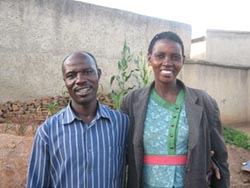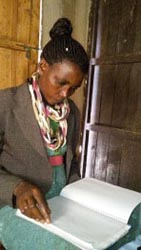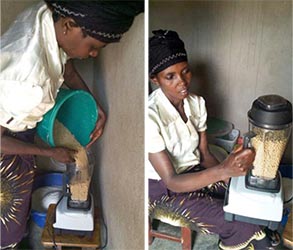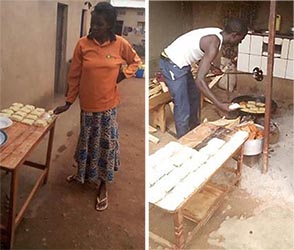This story highlights the testimony of Mukakayonde Claudine, a woman from Mareba Sector, Rango Cell, Bugesera District. She is 47 years old, married to Manassé and they have six children. Her life has changed due to N2Africa project.
Before the start of N2Africa project in her area, she was producing soyabean but with no plan for development. She was mixing all crops together and the yield was always very low. She had no knowledge of an agricultural practice that could lead to increased soyabean yield. However, she knew that soyabean can improve the nutrition of her children.
Her story is told in French and summarized in English.

Je m’appelle MUKAKAYONDE Claudine, du secteur Mareba, cellule Rango, district de Bugesera. Je suis âgée de 47 ans, mariée et mère de 6 enfants. Avant d’être partenaire du projet N2Africa, j’étais productrice de soja mais sans aucun objectif de développement. Je pratiquais cette culture de façon désordonnée en mélangeant n’importe comment haricot, soja, maïs et manioc. De ce fait, la production de soja était dérisoire mais je savais qu’en nourrissant mes enfants avec du soja, ils ne pouvaient pas avoir de kwashiorkor. Avec l’arrivée du projet N2Africa en 2010, j’ai été sélectionnée parmi les premiers partenaires et je me suis engagée comme Master Farmer. J’ai été désignée pour participer à la dissémination de nouvelles technologies sur le soja et le haricot notamment: effet du rhizobium associé du DAP sur le soja; effet de l’association matière organique, engrais NPK et le rhizobium sur le haricot; association du haricot nain et du manioc; rotation du soja et le maïs. Ces technologies ont entrainé une augmentation de rendements de façon que là où je produisais 30 kg, la production est passait à 270 kg. Le projet nous a aidés à faire une comparaison technico économique entre différentes légumineuses (soja, haricot, arachide, vigna, petit pois, pois cajan) et le soja s’est montré meilleur et il peut subir plusieurs transformations. 
de son business Cependant, cette augmentation de la production de soja devenait problématique car le soja était utilisé seulement au niveau domestique. Il fallait trouver un marché pour le soja ou le transformer en d’autres produits beaucoup plus consommables et plus vendables. Le projet N2Africa a compati à notre préoccupation et en 2013, j’ai été intégrée dans un groupe de 24 femmes qui ont suivi une formation sur les techniques de valorisation du soja à Muhanga. Au cours de cette formation, j’ai appris comment faire du TOFFU, du lait de soja, des boulettes, du « thé » de soja, etc. Apres cette formation, je me suis mis au travail en utilisant du matériel local comme le mortier (Isekuru) et le pilon (Umuhini) et j’ai pu produire moi-même du lait, du TOFFU, des boulettes-beignets. Etant dans un coin un peu reculé (Nyamigina), j’ai déplacé mon business pour approcher mes clients à Ruhuha-Rango. Comme je ne pouvais pas satisfaire la demande, N2Africa m’est venu en aide en m’accordant une machine électrique pour piler le soja.
Aujourd’hui, je suis devenue un fournisseur de sous-produits à base de soja, reconnu au niveau de tout le District de Bugesera. Mon business m’a permis de quitter la catégorie 1 d’UBUDEHE (Catégorisation socio-économiques de la population au Rwanda) pour être maintenant dans la catégorie 3. 
J’ambitionne d’élargir mon business et dépasser les limites du District de Bugesera et acquérir la certification de mes produits par le Rwanda Standards Board (RSB). Je compte appeler les autres femmes qui ont participé avec moi à la formation de Muhanga pour intégrer mon business et peuvent devenir des actionnaires dans une compagnie que je compte mettre en place. Je me vois en 2020, Présidente directrice (PDG) d’une usine de transformation du soja en différents produits. Je remercie le projet N2Africa qui m’a permis de faire un pas dans la vie et spécialement KANTENGWA Speciose, les agents de la Caritas: BYAMUNGU Felix et NYIRABARUHIJE Véronique qui n’ont ménager aucun effort pour m’orienter dans mes initiatives. Je remercie vivement le Président de la République du Rwanda, Paul KAGAME, car, sans sa politique de promotion de la femme, je ne serai pas ce que je suis pour le moment. |
|
When N2Africa project started in her area in 2010, she was selected as participant, benefited from trainings and subsequently became a Master Farmer. Her involvement in the dissemination of new technologies on soyabean and bean (such as use of inoculum, organic and inorganic fertilisers, spacing, intercropping and rotation) led to increased soyabean yield of her plot from 30 kg to 270 kg. Since the yield of soyabean was increasing, but only consumed locally, there was a need for external market and also value addition to produce diversified products. This was a challenge for her. Thankfully, the N2Africa project organized a training in Muhanga District on soyabean processing which Claudine attended together with other women. Claudine learnt how to produce soyabean milk, tofu and meatball-donuts which she operationalized using locally available materials soon after the training. Since her business was growing, she moved from her remote area to Ruhuha-Rango where her customers were most based. N2Africa project supported Claudine with an electric soyabean grinding machine to enable her meet the increasing demand for her products . Currently, Claudine is a distributor of soyabean based products in the District of Bugesera. Her business has made her move from the very poor category (Type I) to the medium category (Type III) of Ubudehe typology. She plans to expand her business beyond Bugesera District and also to get a certification license for her products from the Rwanda Standards Board. Claudine also plans to invite other women that participated in the Muhanga training with her to become shareholders in a company she plans to launch soon. Her dream is to become a CEO of her own soyabean processing plant in 2020. |
Claudine is grateful to N2Africa project, Madam KANTENGWA Speciose, Caritas staff: BYAMUNGU Felix and Madam NYIRABARUHIJE Véronique for their guidance to achieve her goals. She also thanks the president of the republic of Rwanda, Paul KAGAME for his policy on gender promotion without which she would not be who she is today.
MUKAKAYONDE Claudine, Rango, Rwanda.


